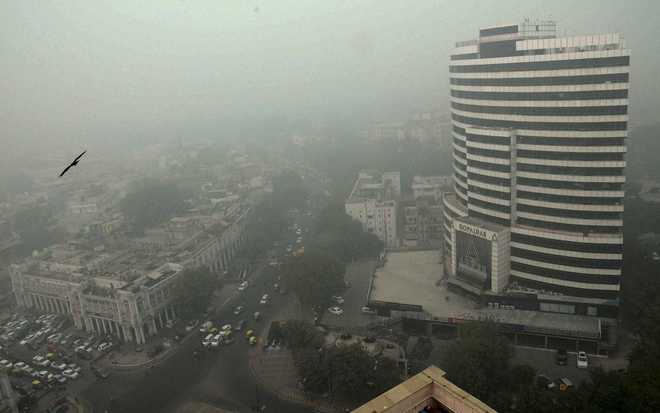
Air pollution contributed to an estimated 1.67 million deaths in 2019. File Photo
New Delhi, October 16
Air pollution, hypertension, tobacco use, poor diet and high blood sugar levels were the top-five risk factors for death in India in 2019, according to a new study.
The Global Burden of Disease (GBD) Study, published in the Lancet journal on Friday, assessed more than 286 causes of death and 369 diseases and injuries in more than 200 countries and territories across the world.
It noted that India has gained more than a decade of life expectancy since 1990, but with wide inequalities between states.
According to the researchers, including Srinivas Goli from the Indian Institute of Public Health Gandhinagar, life expectancy in India has risen from 59.6 years in 1990 to 70.8 years in 2019, ranging from 77.3 years in Kerala to 66.9 years in Uttar Pradesh.
However, they said the increase in 'healthy life expectancy' in India has not been as dramatic as the growth of life expectancy since "people are living more years with illness and disability.
The study found that the largest contributors to increasing health loss in India over the last 30 years were non-communicable diseases (NCDs) like ischaemic heart disease, COPD, diabetes, and stroke.
In 2019, the research noted that the top-five risk factors for death in India were air pollution (contributing to an estimated 1.67 million deaths), high blood pressure (1.47 million), tobacco use (1.23 million), poor diet (1.18 million), and high blood sugar (1.12 million).
According to the researchers, over the past decade there has been more than 0.5 per cent annual increase in the exposure to several highly preventable risks such as obesity, high blood sugar, alcohol use, and drug use globally.
They warned that the greatest cumulative impact on health comes from the striking rise in metabolic risks like high blood sugar, hypertension, and high cholesterol, which have risen 1.5 per cent a year since 2010, and account for nearly 20 per cent of total health loss worldwide in 2019.
The study noted that these metabolic risks have grown by a staggering 50 per cent since 1990, and were responsible for a huge number of deaths globally – with high blood pressure contributing to 1 in 5 deaths (almost 11 million) in 2019, followed by high blood sugar (6.5 million deaths), high BMI (5 million), and high cholesterol (4.4 million).
The scientists said several of the risk factors and NCDs highlighted by the study, including obesity and diabetes were associated with increased risk of serious illness and death from COVID-19.
In the South Asia region, they said non-communicable diseases now contribute to more than half of the years lost due to ill-health, disability or early death, which was dominated by infectious, maternal, neonatal, and nutritional diseases 30 years ago.
Citing an example, the researchers said 58 per cent of the total disease burden in India was now due to non-communicable diseases, up from 29 per cent in 1990, while premature deaths due to NCDs have more than doubled from 22 to 50 per cent.
According to the study, hypertension is the third leading risk factor after air pollution, responsible for 10-20 per cent of all health loss in eight states in India, primarily in the south.
"Most of these risk factors are preventable and treatable, and tackling them will bring huge social and economic benefits," said study lead author Christopher Murray, Director of the Institute for Health Metrics and Evaluation (IHME) at the University of Washington in the US.
"We are failing to change unhealthy behaviours, particularly those related to diet quality, caloric intake, and physical activity, in part due to inadequate policy attention and funding for public health and behavioural research," said Murray. PTI
Join Whatsapp Channel of The Tribune for latest updates.



























